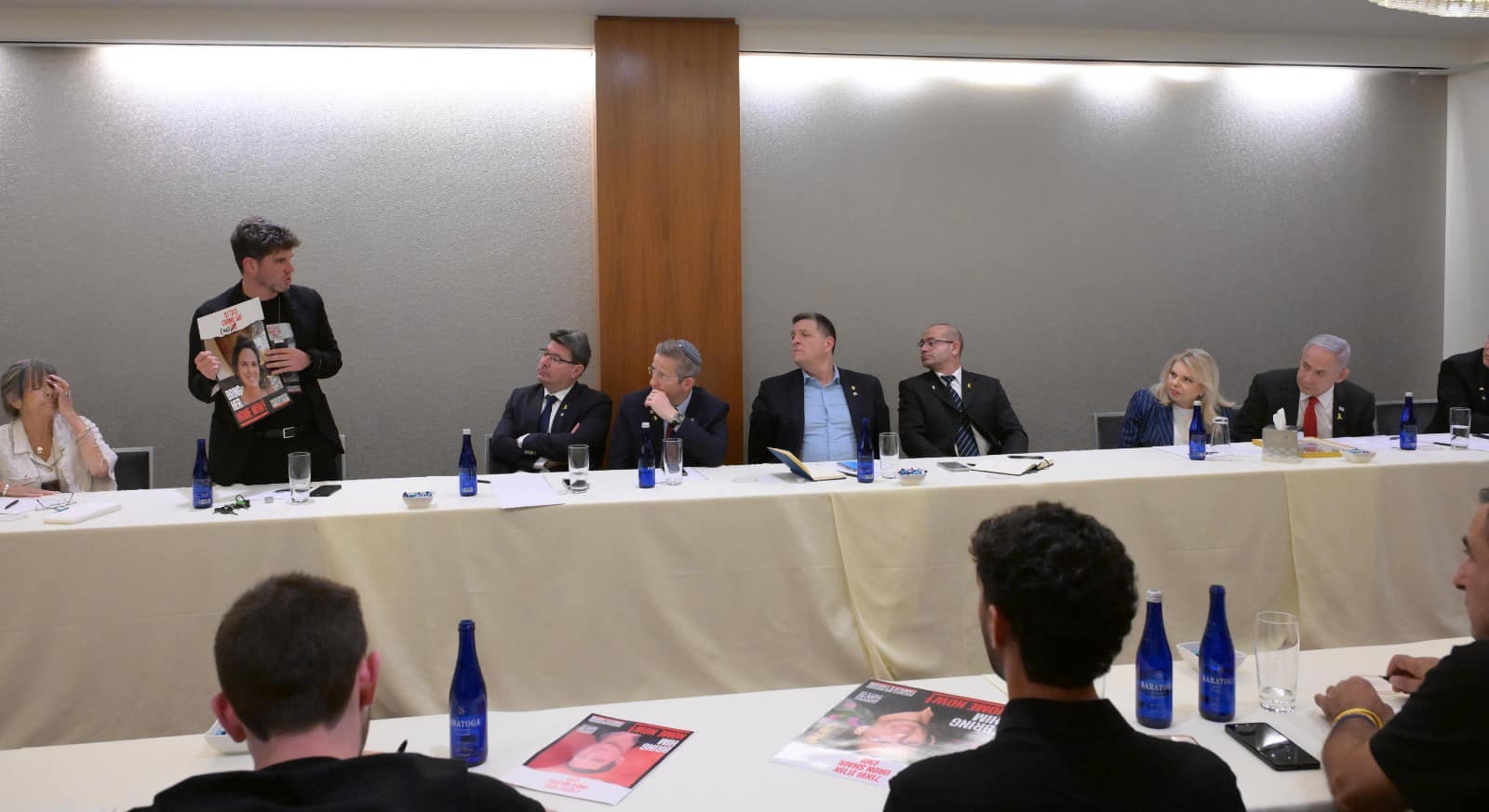Netanyahu meets with hostage families in DC as pressure mounts for a deal
The trip comes as Israel confirmed the death in captivity of two additional hostages

Family members of Israeli hostages held in Gaza meet with Israeli Prime Minister Benjamin Netanyahu in Washington, D.C., July 22, 2023. (Israeli Government Press Office)
(JTA) — Israeli Prime Minister Benjamin Netanyahu met in Washington, D.C. with families of Israeli hostages, one of his first stops on a highly anticipated trip to the United States and a sign of how much focus is being placed on talks over a hostage release and ceasefire deal.
According to a report about the Monday meeting provided by a group representing the families, the families urged Netanyahu to mention the eight Americans still held hostage in Gaza during his speech to Congress on Wednesday. They also told him that they expect him to announce a deal that would return the hostages in exchange for a ceasefire — something that has been subject to months of negotiations, but that U.S. and Israeli officials have said could now be close.
Netanyahu reportedly told the families that conditions for a deal were “coming together, without a doubt.” His optimism was notable because he has previously said he opposes a deal that permanently ends war. He is seen by many Israelis as having stymied previous progress toward a deal that others in his administration were ready to achieve in order to maintain the support of his far-right governing partners, and has also faced criticism for neglecting hostage families at home. Hamas has also previously rejected terms offered by Israel multiple times.
Now, though, Hamas appears to have been significantly weakened and U.S. officials have said they are making a hostage deal a top priority. Axios reported that President Joe Biden, who this week announced that he would end his reelection bid, vowed Monday to end the Gaza war and bring the hostages home before the end of his term, which expires in January.
Both Biden and Vice President Kamala Harris, who appears all but certain to replace him on the Democratic ticket, have previously met with hostage families.
The hostage families also spent an hour with U.S. National Security Advisor Jake Sullivan on Monday evening, in their 12th meeting with him. Sullivan reminded them, they said in a release, that both Israel and Hamas must agree to a deal.
Noa Argamani, a symbol of the crisis whom the Israeli army rescued last month in a rare bright spot in its campaign to extricate the kidnapped Israelis, traveled with Netanyahu to Washington together with other hostage families, despite facing pressure from the relatives of other hostages not to. Some hostage families and their supporters also flew to the United States to protest against Netanyahu during his visit; some U.S. Jewish groups have announced plans to join them.
Netanyahu’s visit comes as pressure mounts for a deal. On Monday, Israel announced that it had confirmed the deaths of two hostages in Gaza. Yagev Buchstav and Alex Dancyg died in Khan Younis months ago, the army announced, noting that it would investigate whether they were killed by Israeli fire. Dancyg, an educator who was born to Holocaust survivors in Europe, had become a particularly prominent figure after hostages released in a deal in November said he had been delivering history lessons in captivity. He would have turned 76 this week.
“The news of his tragic death strengthens our commitment to ensure that Alex’s legacy and the stories he passionately preserved are never forgotten,” Yad Vashem, Israel’s Holocaust museum where Dancyg worked, said in a statement.
There are 116 hostages being held in Gaza, including 44 whom the Israeli army has said are dead. Eight — including three who have been confirmed dead — hold American citizenship. They include Hersh Goldberg-Polin, 23, whose parents, Rachel Goldberg and Jon Polin, recently organized a “Week of Goodness” on behalf of the hostages; Keith Siegel, 64, whose wife Aviva was released in November; and Edan Alexander, 19, who grew up in New Jersey and moved to Israel to join the army. Several of their relatives participated in the meeting with Sullivan on Monday night.
Polls show that the clear majority of Israelis want a hostage deal, even if reaching one requires pausing or ending the war against Hamas. But the anti-deal camp got a boost on Monday as several prominent religious Zionist rabbis allied with the right urged against a ceasefire, saying in an open letter that the risks presented to Jewish life of agreeing to halting the fighting and releasing Palestinian prisoners trumps the commandment to redeem hostages.
“We suggest to our leaders that God will present good counsel on how to redeem the hostages, while ensuring the continued existence and well-being of the State of Israel,” the letter said.
A message from our CEO & publisher Rachel Fishman Feddersen
I hope you appreciated this article. Before you go, I’d like to ask you to please support the Forward’s award-winning, nonprofit journalism during this critical time.
We’ve set a goal to raise $260,000 by December 31. That’s an ambitious goal, but one that will give us the resources we need to invest in the high quality news, opinion, analysis and cultural coverage that isn’t available anywhere else.
If you feel inspired to make an impact, now is the time to give something back. Join us as a member at your most generous level.
— Rachel Fishman Feddersen, Publisher and CEO